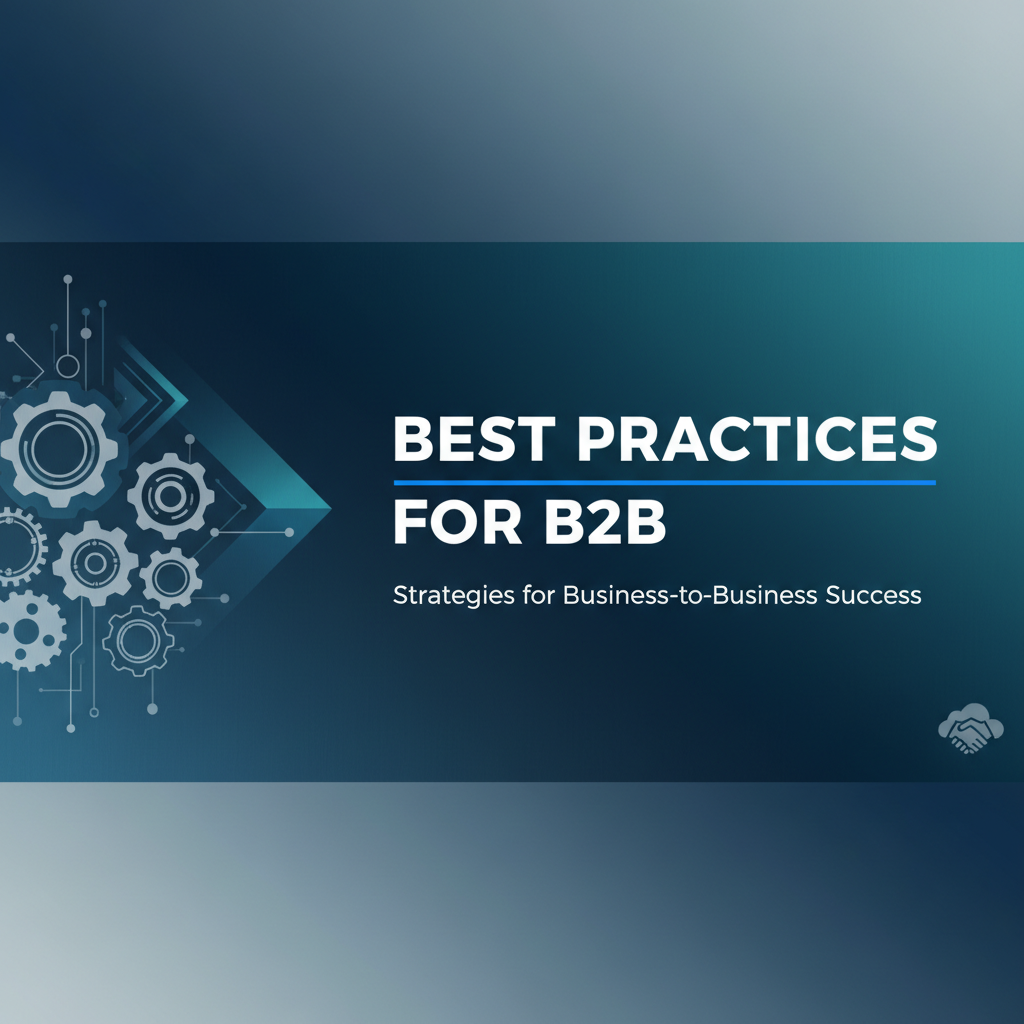
Mastering B2B: Proven Strategies for Sustainable Growth
The world of B2B, or business-to-business, is a complex ecosystem demanding a unique approach compared to B2C. Success in B2B hinges on cultivating strong, long-term relationships, providing quantifiable value, and understanding the intricate needs of your clients. This post outlines key best practices to help you thrive in the B2B arena and achieve sustainable growth.
Understanding Your Target Audience:
The foundation of any successful B2B strategy lies in deeply understanding your target audience. This goes beyond basic demographics. You need to know their industry, the challenges they face, their key performance indicators (KPIs), and their decision-making processes. Conduct thorough market research, analyze industry trends, and engage directly with potential clients to gain invaluable insights. Creating detailed buyer personas will help you tailor your messaging, product development, and sales efforts to resonate with their specific needs. This ensures you're not just selling a product or service, but offering a solution that directly addresses their pain points.
Actionable Insight: Implement regular customer surveys and feedback sessions to continuously refine your understanding of your target audience and adapt your strategies accordingly.
Building Trust and Authority:
In B2B, trust is paramount. Businesses are entrusting you with their resources and reputation, so you need to demonstrate credibility and expertise. This can be achieved through various means, including thought leadership content, case studies, and testimonials. Publish insightful articles, blog posts, and white papers that showcase your knowledge and provide valuable information to your target audience. Share success stories from satisfied clients to illustrate the tangible benefits of your offerings. Participate in industry events and webinars to establish yourself as a thought leader and connect with potential clients.
Actionable Insight: Invest in creating high-quality, informative content that addresses the specific challenges and needs of your target audience.
Developing a Value-Driven Approach:
B2B buyers are primarily driven by value. They need to see a clear return on investment (ROI) for their purchases. Focus on highlighting the tangible benefits of your products or services, such as increased efficiency, reduced costs, or improved revenue. Quantify the value you provide whenever possible, using data and metrics to support your claims. Tailor your value proposition to the specific needs of each client, demonstrating how your solutions can address their unique challenges.
Actionable Insight: Conduct a thorough ROI analysis for your key offerings and use this data to showcase the value you provide to potential clients.
Streamlining the Sales Process:
The B2B sales process is often longer and more complex than B2C sales. It typically involves multiple stakeholders and decision-makers. To streamline the process, it's crucial to have a well-defined sales funnel with clear steps and milestones. Implement a customer relationship management (CRM) system to track leads, manage interactions, and automate tasks. Provide your sales team with the necessary tools and training to effectively engage with prospects and close deals. Focus on building rapport and establishing trust throughout the sales process.
Actionable Insight: Map out your sales process, identify potential bottlenecks, and implement strategies to streamline each stage.
Leveraging Digital Marketing:
Digital marketing plays a vital role in B2B lead generation and brand awareness. Develop a comprehensive digital marketing strategy that encompasses search engine optimization (SEO), content marketing, social media marketing, and email marketing. Optimize your website for relevant keywords to attract organic traffic. Create engaging content that educates and informs your target audience. Utilize social media platforms like LinkedIn to connect with potential clients and share valuable insights. Nurture leads through targeted email campaigns.
Actionable Insight: Conduct a thorough SEO audit of your website and implement strategies to improve your search engine rankings.
Prioritizing Customer Relationships:
Building strong, long-term relationships is crucial for B2B success. Focus on providing exceptional customer service and support. Respond promptly to inquiries and resolve issues efficiently. Proactively communicate with clients to understand their evolving needs and provide ongoing support. Foster a culture of customer centricity throughout your organization. Regularly solicit feedback and use it to improve your products, services, and processes.
Actionable Insight: Implement a customer success program to proactively engage with clients, address their needs, and ensure their satisfaction.
Measuring and Analyzing Results:
It's essential to track and analyze your B2B efforts to identify what's working and what's not. Use analytics tools to measure website traffic, lead generation, conversion rates, and customer satisfaction. Monitor your key performance indicators (KPIs) and identify areas for improvement. Regularly review your strategies and adjust them as needed based on the data. This data-driven approach will help you optimize your B2B efforts and achieve better results.
Actionable Insight: Implement a system for tracking key performance indicators (KPIs) and regularly analyze the data to identify areas for improvement.
Continuous Improvement:
The B2B landscape is constantly evolving, so it's crucial to embrace a culture of continuous improvement. Stay up-to-date on the latest industry trends and technologies. Continuously evaluate your strategies and processes, and identify opportunities for optimization. Encourage experimentation and innovation. By embracing continuous improvement, you can stay ahead of the competition and achieve sustainable growth in the B2B market.
Actionable Insight: Dedicate time each week to research industry trends and identify opportunities for innovation and improvement.
In conclusion, mastering the B2B landscape requires a strategic and consistent approach. By focusing on understanding your target audience, building trust, delivering value, streamlining the sales process, leveraging digital marketing, prioritizing customer relationships, measuring results, and embracing continuous improvement, you can position your business for long-term success. Remember that B2B is about building mutually beneficial partnerships that drive growth for both your organization and your clients.